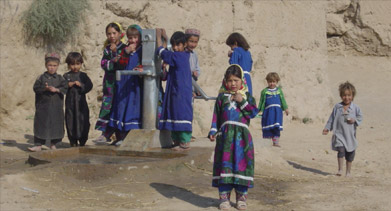New MSc focuses on humanitarian crises
With the world facing potential humanitarian catastrophes in Syria and Mali, the University of York’s Post-War Reconstruction and Development Unit (PRDU) has launched the inaugural MSc in International Humanitarian Affairs.
 The new programme is launched in advance of a major conference in New York in April, hosted by the University, at which leading experts from around the world will discuss the role of education in helping to deliver peace and long-term development in fragile or conflict-affected countries.
The new programme is launched in advance of a major conference in New York in April, hosted by the University, at which leading experts from around the world will discuss the role of education in helping to deliver peace and long-term development in fragile or conflict-affected countries.
The MIHA programme, which is being run in collaboration with the Humanitarian Policy Group at the Overseas Development Institute (HPG-ODI), is a three-year online distance learning programme. The MIHA has been designed to provide an academic setting for humanitarian professionals:
- To develop how they understand and respond to humanitarian needs in complex operational contexts such as violent conflict, natural hazards and political crises
- To reflect critically on contemporary issues, challenges and dilemmas using the strategic perspective of ‘international politics’ as well as the technical approaches of the main humanitarian sectors
- To gain advanced research skills, demonstrate how to design evidence-based policy, and learn how to use theory to maintain best practice
The first MIHA cohort consists of 25 students from 18 countries. The depth and diversity of this first intake illustrates the need for this programme in a continually developing international humanitarian system.
Its director, Dr David Connolly, said: “The programme’s dynamic learning approach highlights the potential benefits for humanitarian professionals to interact with and share experiences with their peers using the virtual academic space and web-based conferencing.
“Crucially, the MIHA online and distance learning approach allows the students to remain employed as humanitarian professionals whilst completing this challenging and exciting programme.”
Six of the current MIHA students are winners of academic scholarships, comprising fee waivers for the first year of their studies.
The MIHA online and distance learning approach allows the students to remain employed as humanitarian professionals whilst completing this challenging and exciting programme
Dr David Connolly
Studying part-time, MIHA students have the opportunity of gaining three postgraduate qualifications: Post-graduate Certificate (Year 1), Diploma (Year 2), and MSc (Year 3). During Years 1 and 2, students specialise in the four core areas/sectors - health, shelter, law, and education – in addition to modules in ‘international politics’ and ‘evidence-based policy’. In the third year, they design and complete an independent project in the form of a 15,000 word dissertation, with support from PRDU academic faculty and policy experts.
Joining Dr Connolly is Dr Mark Clegg as the teaching fellow and Emma Piercy as programme administrator. The modules will draw upon relevant PRDU research, including the work of Professor Sultan Barakat while PRDU associates, Gianni Rufini and Dr Simon Robins, have written some of the modules.
The MIHA programme is scheduled to run again from October 2013 and applications will be invited from March. Further information will be posted on the website: https://www.york.ac.uk/politics/centres/prdu/training/msc/
The New York event, in collaboration with Columbia University, will bring together participants from fragile states, countries emerging from conflict, donors, UN agencies, and academic experts to address the role education can play in fragile and post-conflict situations. As well as aiming to increase local capacity in the education sector, the conference will provide a platform to improve communication between decision-makers on the ground and international funders to promote stronger South-North dialogue.
The initiative developed out of Education in Conflict and Emergencies, a joint programme of research and advanced learning between the Post-war Reconstruction and Development Unit and the Institute for Effective Education at the University of York.
Further information
